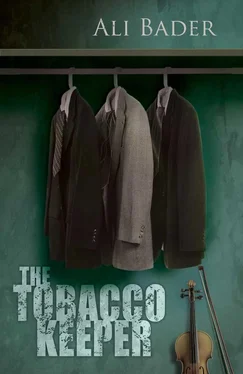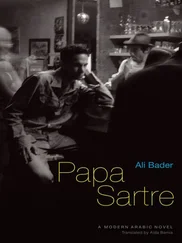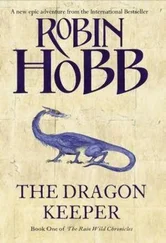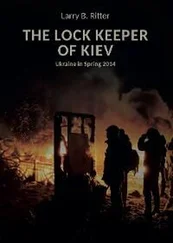What happened during the years that led to Kamal Medhat’s murder? Information is, in fact, quite scarce. During the years following the Kuwait war, Kamal Medhat was forgotten. When he walked in the streets, he would meet a wave of people running towards a free meal offered by the government in some square or park. He would stop and look at a crowd of men and women in tatters, starving and barefoot, women’s headscarves billowing. They would rush through a side door opened for them by the guards, to eat a free meal of rice offered by the state to the poor. Everything else was hazy and vague. He wrote to Farida: ‘Life is cold and empty. Baghdad is a world enveloped by mystery. The streets are filthy, the shops are empty, and the faces are pale, sickly and desperate. Classical music halls have turned into popular haunts for vulgar songs.’
The only surviving image of that elderly musician in the residents’ minds was his slow daily walk on the streets of Al-Mansour. They retained the image of a widower having an affair with his maid, a man with grey hair and a light grey beard who was dressed in the same old, shabby clothes that he’d been wearing for years. He often carried a Russian book as he walked on the same street almost every day from his house in Al-Mansour to the end of Al-Haretheya Street and back. He was sometimes accompanied by his maid Fawzeya and he frequently stood in line for his ration of eggs or a piece of chicken distributed to retired state officials, from time to time, by the government.
This was all the information that we managed to get concerning his life between the two wars. We discovered that during the last war, of 2003, he heard the doorbell ring while he was watching the news on television. He got up, pulled the curtain and looked out of the window. Amjad Mustafa was at the door.
It was a huge surprise for Kamal Medhat. Amjad Mustafa was a completely changed man. His eyes were lifeless and his paunch jutted forward. He was short of breath and the effects of addiction were clear on his face. He looked worn out. His body was flabby and his clothes were old and threadbare. He wore an old, navy blue jacket, a tatty shirt and a pair of jeans that were completely faded.
Kamal took him into the lounge and asked Fawzeya to make them some coffee. Amjad Mustafa rushed towards the bar to pour himself a glass of red wine.
‘What’s happened to you, Amjad? You look so different,’ said Kamal Medhat.
‘We’re all different,’ he answered smiling.
Patriotic talk had vanished completely from his conversation. He no longer believed in the divine mission of the Arab nation, which he’d espoused during the past years of victory, glory and historical revisionism. Now it was all the manifest destiny of the American nation, the new drive towards the Tocquevillean dream of democracy and human rights. It was a dream that Kamal Medhat also believed in, despite his fears of uncontrollable populist movements. He wanted change to happen, no doubt. But at what price? Nobody knew. It was still untested, unknown and therefore unfathomable. They could neither push it forward nor stand in its way.
‘Who can drive out the US forces?’ Amjad asked Kamal Medhat.
‘Nobody,’ he replied.
‘Then let it be. Let’s achieve democracy, development and civic rights. Then the nation can decide its destiny.’
Kamal drank his coffee and looked straight out of the window at the thick, wooded garden outside.
‘Do you trust America?’ he asked Kamal.
Kamal Medhat had absolutely no faith in imperialism, for he rejected all forms of domination, power and violence. He totally abhorred the spirit of smug victory, whether embodied in Iraqi nationalism or American patriotism.
To refute his argument, Amjad said, ‘Haven’t you read Saadi Youssef’s latest poem, An Invitation to Tony Blair ? He was urging the British Prime Minister to occupy Iraq.’
Kamal Medhat was astonished to hear that. Could it be true? Then he smiled a little. The dream of change dominated the thinking of all intellectuals. Amjad Mustafa was the victim of his own feelings of extreme oppression. He was an addict suffering the pain of failure and desperate for his lost dream of glory. Like a novice sailor overpowered by the wind, he didn’t know how to set his sail. Feeling totally oppressed, he made brief remarks, waved his arms, smoked, cursed and drank red wine in frantic haste.
A few days later, Kamal Medhat was sitting in an armchair by the window in the lounge, watching the movements of the tree branches outside. It was difficult for him to formulate ideas or adopt a stand. Everything was as churned and confused as the movement of the tide. Looking up, he was appalled to see the images of aircraft carriers advancing, fighter planes of all types, Marines with their helmets and military gear marching in formation, and long-range missiles being installed in the desert. Colossal forces were advancing in the desert, led by tanks and armoured vehicles. Other forces were at their bases in the Gulf countries, from which they would march to invade Iraq. The dogs of war were barking and the masses were watching the armed forces taking positions and digging trenches in the streets. Food was becoming scarce and there were numerous checkpoints in public squares and parks. Military and security patrols roamed every alley and street.
Kamal Medhat woke up from his sleep to the sound of huge explosions near the house. For a few moments, he was drenched in sweat. He was worried and afraid. He looked at the damp, rusty room swimming in darkness. With his tall, slightly stooping gait, he went towards Fawzeya, who was sitting close by. Then the sound of another violent explosion made Fawzeya jump and rush to the window. There was a burning car standing parallel to the pavement and a house was on fire. A flower shop had been completely demolished.
He returned to his place near the window and looked at the moon. It was a warm night as the weather forecast had predicted. Everything had been fine until now. He exchanged a few words with Fawzeya. They prepared a meal together, sat down and ate. He cracked a joke and she smiled. She didn’t mention anything about his excessive drinking these days. He didn’t mention the war or his dread of what the coming days might bring. He raised his glass and drank to her health. When he looked again through the window, the garden had become a block of light.
Ten days had passed since the war had begun. Looking out of the window, Kamal Medhat watched the city being consumed by fire. He saw the fighter planes like black insects bombing everything: bridges, homes, buildings and factories. He watched Baghdad as it turned into a mass of smoke. A dust storm was blowing, uprooting everything in its path while the armed forces escaped with their equipment. Soldiers launched rockets from among the houses. Ambulances carried soldiers swimming in their blood. Soldiers deserted the front while others took shelter in houses and hospitals.
He decided to go out. The moment he opened the door, a slap of cold air struck him. He buried his neck in the collar of his coat and shrank inside it. He dragged his feet with great difficulty and walked along the pavement. He looked through the window of a semi-burnt-out villa and saw a burnt wooden table and bookcase. Firemen were carrying the wounded and the dead on stretchers.
He continued to walk. Smoke was billowing out of a rose-coloured brick house that was encircled by a wall. On the wall there was a poster inviting people to donate blood and the words ‘Death to Americans’ were scrawled in black paint. The windows of a house level with the street; a woman speaking to a man holding a nylon bag.
On the final day of the war, he sat in the living room, looking into the corner. The house was completely dark because the power had been cut off. He drew the curtains to bring some light into the room. Fawzeya entered. She seemed disturbed and the words came rushing from her lips. She told him how the army had disappeared entirely from the streets and how people were looting government offices. He was appalled. He knew that the mob would rise once again and realized that they would overtake the whole country. His heart thudded so violently that he felt out of breath.
Читать дальше












